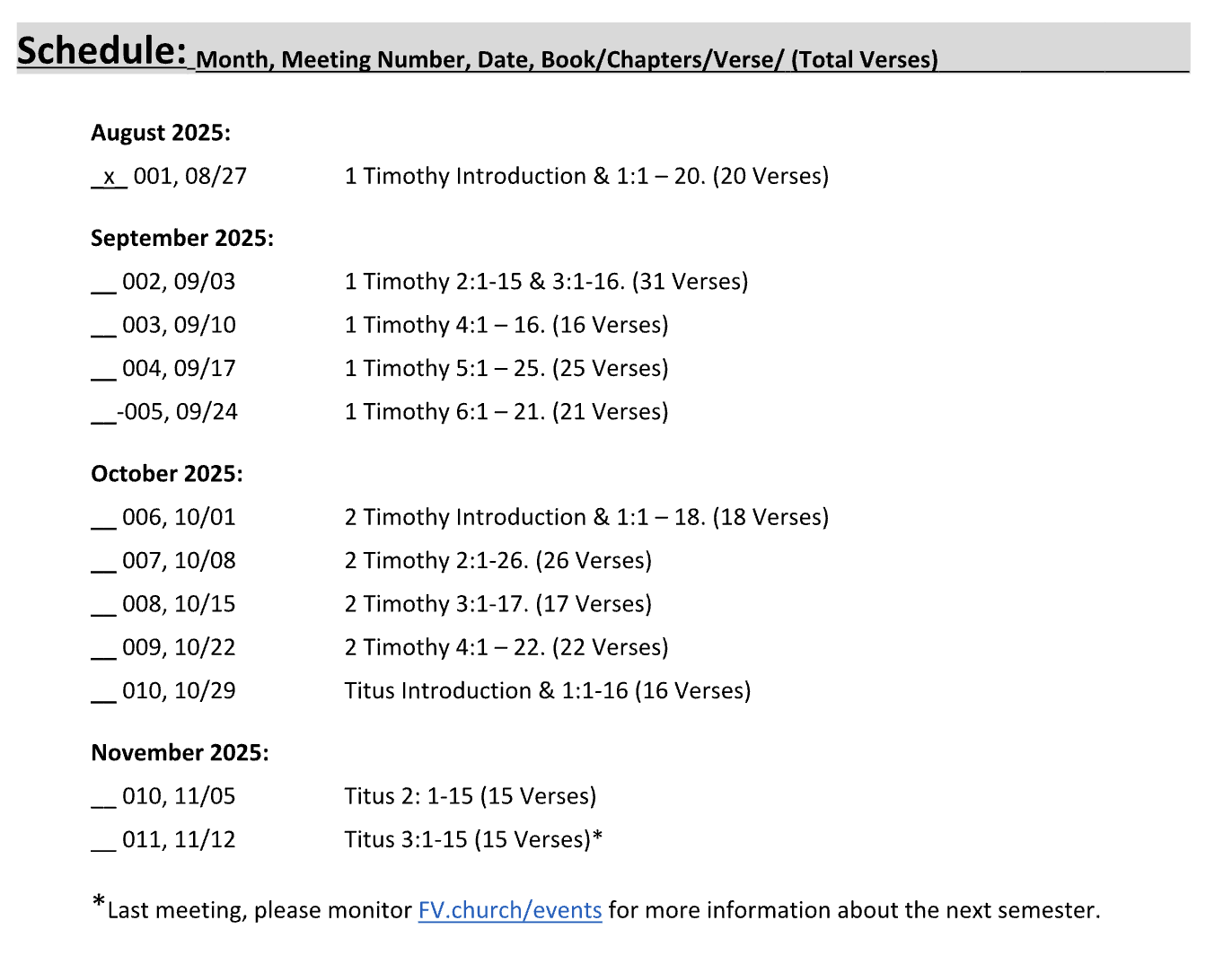Weekly Wednesdays: CALLED Men’s Group | Wednesday, August 27, 2025
Meeting# 1 of 12 | This Week’s Leader: David Goodno
Introduction: Welcome everyone, this is the first meeting of the Fall 2025 semester of the Men’s “Called” Growth Group. We will be meeting weekly every Wednesday, Aug. 27, 2025, through Nov. 12, 2025; 7:00 pm – 8:30 pm.
There is no formal “membership” or special requirements to attend the Men’s Group; it doesn’t matter where you are in your faith journey – 10 seconds, 10-years or a lifetime; everyone is welcome; everyone has value; everyone has a voice. Keep in mind that we all come from various backgrounds, we all have different points of view; we all are at different places in our individual faith journey; the purpose of our meeting tonight is to come together, read the Bible, study God’s word and have a friendly discussion.
If there are differing points of view, we should not feel attacked or be hostile to one another; it’s our differences that add to the meeting and discussion. We came together tonight as friends and brothers in Christ; we should leave the same (as friends and brothers in Christ). Often there is no right or wrong answer; just various interpretations of scripture – ultimately, JESUS IS THE ANSWER.
Last semester we studied Thessalonians. Paul established a church in Thessalonica; Paul was forced to leave the church and was unable to return. In his place, Paul sent Timothy to guide the members of the Thessalonian church.
This semester we are conducting a study* of First and Second Timothy and Titus. (*SOAP study: Scripture, Observation, Application, Prayer and Questions).
History of the letters: (1 & 2 Timothy )
Paul is author of these letters to Timothy and Biblical scholars date the letters about 64 AD.
The letters were written to give encouragement and instruction to Timothy, who was a young leader in the church and one of Paul’s closes companions. Paul sent Timothy to the church at Ephesus to counter the false teaching that had arisen there. Paul hoped to visit Timothy, but in the meantime wrote the letter to give practical advice about ministry.
Today we can use the letter to strengthen our own faith and spiritual discipline.
Timothy is a good example of one who was influenced by Godly relatives. His mother, Eunice and grandmother, Lois were Jewish believers who helped shape his live and promote his spiritual growth. The fist “second generation” Christian mentioned in the New Testament is Timothy; he became Paul’s protégé and pastor of the church of Ephesus.
As a young minister Timothy faced all sorts of pressure, conflicts, and challenges from the surrounding culture. Paul instructed Timothy to preserve the Christian faith, oppose false teaching, and remain disciplined; guarding motives to minister faithfully and live above reproach (that is not to be hypocritical, and lead by example).
The church has a responsibility to care for the needs of all its members, especially the sick, the poor, the widowed. The church is to watch over and take care of and encourage its members. - And our caring must go beyond just good intentions or wishing a believer to be well.
This Week’s Prayer: Father God, we thank you for allowing us to come together and study your word tonight. We recognize you as the Lord of our lives. Father, thank you for sending Jesus to save me from my sin. Give me the desire and courage to live a pure life amidst this sinful world. Give us faith, hope, love and encouragement. Help us commit to reading Your word and lean into you for understanding. – Amen
Scripture, Read: 1 Timothy Chapter 1:1 – 20
Observation, Application & Questions: (Identify/Discuss Among the Group)
When writing the letters to Timothy, Paul had been out of prison for several years, and during that time he had revisited many churches in Asia and Macedonia. When he and Timothy returned to Ephesus, they found widespread false teaching in the church. Paul had warned Ephesian elders to be on guard against false teachers who would come after he had left. Paul sent Timothy to lead the Ephesian church while he moved on to Macedonia. From there Paul wrote his letters to Timothy as encouragement.
Read: Acts 20:1 (end of 1, “…Then he said good-bye…”) – 6, and Acts 20: 16-31.
Discuss among the group.
Key verses for discussion:
(Chapter 1, verses 1-6) -
Paul calls himself an “apostle” which means “one who is sent.” No matter where we are, no matter what we are doing, we must live our lives as if we were sent (#livesent). We often think that missionaries travel to distant lands to spread the gospel. While it is good to go on missionary trips, we should also view our day-to- day errands, trips to stores, and restaurants, and even our workplaces as our mission field.
Discuss among the group.
The church at Ephesus may have been plagued by similar false teachings that were affecting the Colossian Church; teachings that in order to be acceptable to God, a person had to discover certain hidden knowledge and worship Angels.
Read: Colossians 2:8-23, discuss.
We should stay away from religious speculation and pointless theological arguments. These take away from our study of the truth and sidetrack us from the central message of the Good News – the person, work, sacrifice and overcoming of sin and death by Jesus Christ.
Many leaders and spiritual authorities demand allegiance above everything else. Some would even have us turn from Christ to only follow them. – this is not the correct order of things. Christ comes first; above all else. Putting Christ first makes us better husbands, fathers, mentors…
What are some ways we can identify false teachers? – They promote trivial and divisive controversies instead of helping people come to Jesus. They aren’t concerned about personal evidence of God’s presence in their lives. They spend most of their time trying to make a name for themselves. To protect ourselves from false teachers we should learn what the Bible teaches and remain steadfast in our faith in Christ.
(Chapter 1, verse 8-19)
Arguing about details of the Bible can send us off on interesting but irrelevant tangents and cause us to miss the intent of God’s message. The false teachers at Ephesus constructed vast speculative systems and then argued about minor details of imaginary ideas.
The false teachers wanted to become famous as teachers of God’s law, but they didn’t understand the law’s purpose. The law was not meant to give believers a list of commands to follow, but to show unbelievers the love that God has for us, His forgiveness of sin, and developing a relationship with Him. People can feel so guilt-ridden by their past that they think God could never forgive and accept them, but this is not true.
Read: Romans 6:6-14, and
Matthew 7:21-29 discuss.
We should treasure our faith in Jesus more than anything else. As we walk with God and study His word, He will speak to us. He will work within us and overtime we will know the difference between right and wrong.
Other questions to explore:
What was the context? What was going on at the time this was written?
What and where is this happening?
What makes what was happening meaningful?
Is there anything special about the location (or locations)?
Who is involved?
How do they respond to God?
What character traits do you notice about them?
What is the significance of their involvement?
What do you think is the key message?
Did anything that surprised or stood out to you? What was it? Share with the group and discuss.
Are there any key verses that stand out to you? Discuss among the group.
Were there any repetitive words or themes that stood out to you? What were they?
---
Is there anything that left you with more questions? What were they? Share with group, discuss, and research.
Biggest takeaway?
Prepare for next week’s meeting. Read: 1 Timothy 2:1-15 and 3:1-16
Is there anything that stands out when reading these verses? Be ready to discuss it at the next meeting. https://www.biblegateway.com/passage/?search=1%20Timothy%202-3&version=NLT
Think of things that you can do to encourage new believers over the next seven days.
Read Acts 9:1-43




